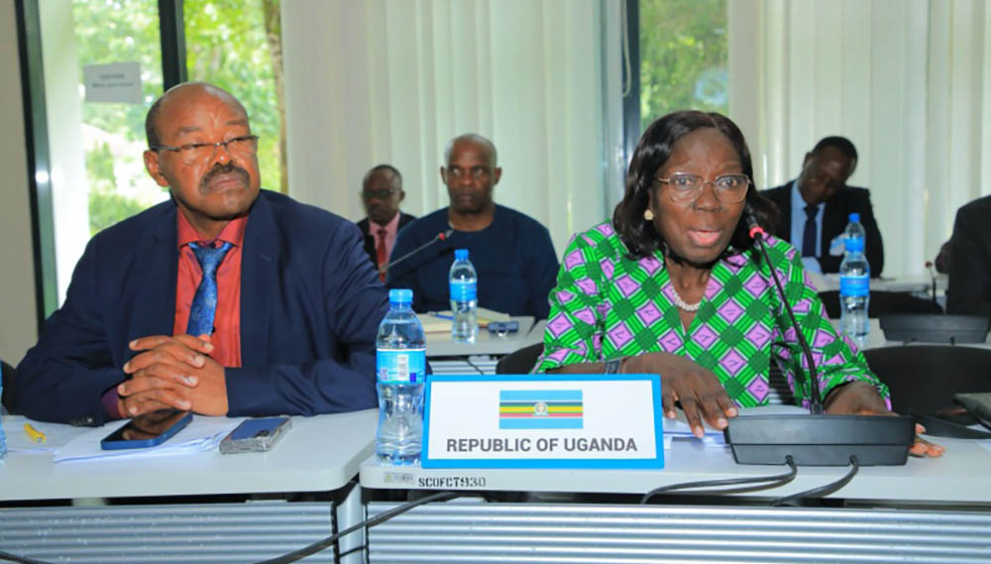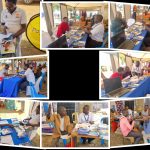Enhancing Trade Facilitation in the East African Community: The Role of Mobile Technology and Policy Initiatives

The East African Community (EAC) Secretariat and Partner States are tasked with implementing the EAC Elimination of Non-Tariff Barriers (NTBs) Mobile Application by April 30, 2024. Developed with the assistance of Trademark Africa, this app aims to streamline reporting, monitoring, and elimination of NTBs within the community.

The East African Community Secretariat and Partner States have been asked to implement the EAC Elimination of Non-Tariff Barriers (NTBs) Mobile Application, including sensitization, by April 30, 2024.
The Ministerial Session of the 43rd EAC Sectoral Council on Trade, Industry, Finance, and Investment (SCTIFI), which was held at the EAC Headquarters in Arusha, Tanzania, also commended Trademark Africa for its assistance in the development of the EAC Elimination of Non-Tariff Barriers (NTBs) Mobile Application.
The EAC Elimination of NTBs Mobile Application was created to facilitate the reporting, monitoring, and elimination of NTBs in the community. The EAC Elimination of Non-Tariff Barriers (NTBs) Mobile Application was finalized and tested during the March 2023 National Monitoring Committee (NMC) meetings.
The EAC NTBs App allows users to lodge complaints in any of the three (3) official languages of the EAC: English, Swahili, or French. The mobile app is available for download from the Apple Store, Google Play, and other Android devices, and may be accessed via https://eac-mobile.portal.africa.
The Secretariat, in conjunction with Trademark Africa (TMA), introduced the EAC Elimination of Non-Tariff Barriers (NTBs) Mobile Application at the formal opening ceremony of the 23rd EAC MSMEs Trade Fair in Bujumbura, Burundi, on December 8, 2023.
The Secretariat, with help from Trademark Africa, will educate and train relevant public and private stakeholders in Partner States on the EAC Elimination of NTBs Mobile Application to ensure timely reporting, monitoring, and elimination of NTBs in the Community.
NTBs have been a significant impediment to the free movement of commodities as outlined in the EAC Customs and Common Market Protocols.
NTBs often refer to any barriers to international trade that are not import or export levies. NTBs might take the shape of import quotas, subsidies, customs delays, technical barriers, or other systems that hinder or impede commerce.
The Ministers were briefed of the status of NTB resolution from July to November 2023, with nine (9) NTBs remaining outstanding and two (2) NTBs concluded. Since 2007, there have been a total of 269 (two hundred and sixty-nine) NTBs resolved.
The Ministers highlighted that NTB-001-114 on exercise books between the Republic of Uganda and Kenya was resolved by the 2022 modified VAT Act.
The conference directed Uganda and Kenya to convene a bilateral meeting to settle NTB 000-864, which concerns unfair excise duty on juice, by June 30, 2024, and to report to the 45th SCTIFI.
The Sectoral Council also asked Kenya and Tanzania to conduct a joint verification of motorcycle accessories transferred from Kenya to Tanzania by June 30, 2024, and report to the 45th SCTIFI.

The Ministers directed the Secretariat to prioritize the harmonization of calibration services for road tankers in the Region during the fiscal year 2024/2025.
The SCTIFI approved discussions of Free Trade Area (FTA) agreements between the EAC and the United Kingdom, United Arab Emirates, Pakistan, and Singapore.
The SCTIFI directed the Secretariat to contact the United Kingdom, the United Arab Emirates, Pakistan, and Singapore by July 30, 2024, to begin discussions for FTA agreements.
The Ministers agreed that negotiations with Turkey, China, and Serbia would take place when FTA negotiations with the United Kingdom, United Arab Emirates, Pakistan, and Singapore were completed.
In order to simplify and reform avocado export procedures in the Community, the Ministers directed Partner States to simplify export procedures for avocado commodities as well as other fruit and vegetable exports.
Partner States were also directed to rationalise the issue of various licenses and licensing procedures in order to eliminate those that are unnecessary to achieve the goals sought by the private sector.
The Ministers agreed that Partner States should implement risk management to ensure regulatory compliance, as well as produce a single and standardised set of paperwork and information requirements for avocado and other vegetable and fruit exports that follows global best practices.
The SCTIFI also urged Partner States and the Secretariat to raise funds for quality infrastructure for fruits and vegetables.
The Secretariat was also asked to hold a meeting of Trade and Customs specialists by April 30, 2024, to rationalize agricultural export permits and licensing requirements, as well as produce uniform and standardised export papers.
During the opening session of the Ministerial Session, SCTIFI Chairperson William Anyuon Kuol Wol noted that efforts to reduce NTBs within the EAC had been noteworthy.
“However, to sustain this progress, it was imperative for all stakeholders, including the private sector, to play a pivotal role in holding the EAC accountable and in devising effective mechanisms to address and monitor the reduction of NTBs,” Wol said in a statement.
Wol also highlighted the progress made in implementing the Single Customs Territory and the impact of One Stop Border Posts on lowering transit costs as notable achievements, but emphasized the importance of engaging in outreach programs that educate East Africans about the integration process and its relevance in their lives.
In his remarks, EAC Secretary General (Dr.) Peter Mathuki stated that intra-trade values have steadily increased in recent years.
“In the fiscal year 2021/2022, intra-trade totaled US$ 8.7 billion, rising to US$ 9.4 billion in the fiscal year 2022/2023. This revealed a strong trading environment among EAC Partner States, with an increase of roughly 7.98%,” Dr. Mathuki stated.
Dr. Mathuki urged Ministers to address issues such as denial of preferential market access for EAC-originating goods, non-ratification of key EAC instruments, finalisation of EAC Tariff Offers for Category B and C to boost intra-African trade, cross-border challenges to free movement of goods and persons, and resolution of existing NTBs.
Mr. Bruno Mbayi Bashadila (Ministry of External Trade, DRC), Hon. Marie Chantal Nijimbere (Minister of Trade, Transport, Industry, and Tourism, Burundi), Hon. Peninah Malonza (Cabinet Secretary, Ministry of East African Community, ASALs, and Regional Development, Kenya), and Mr. Richard Niwenshuti (Ministry of Trade and Industry, Rwanda) were also in attendance at the meeting.
Hon. Exaud S. Kigahe, Tanzania’s Deputy Minister for Industry and Trade, Hon. Rebecca Kadaga, Uganda’s 1st Deputy Prime Minister and Minister of EAC Affairs, and Ms. Annette Ssemuwemba, the EAC’s Deputy Secretary General in charge of Customs, Trade, and Monetary Affairs, were also present.







